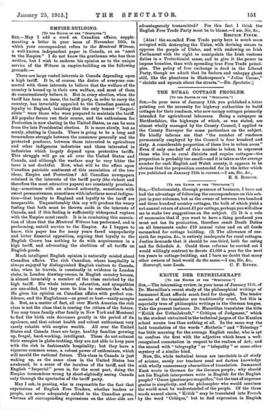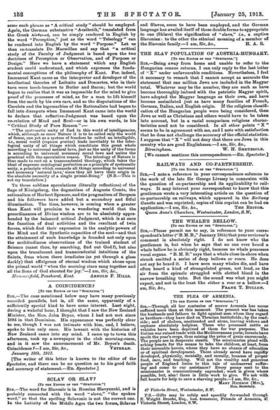KRITIK DER URTHEILSKRAFT.
[TO THE EDITOR OF THE "SPECTATOR."]
Sin,—The interesting review, in your issue of January 11th, of Dr. Macmillan's recent study of the philosophical writings of Immanuel Kant affords much food for thought. The tender mercies of the translator are traditionally cruel, but this is especially true of philosophic writings in the German tongue. Take the present instance. Dr. Macmillan translates the title " Kritik der Urtheilakraft," " Critique of Judgment," which to the student untrained in the technical jargon of the Kantian school means less than nothing at all. In the same way the bald translation of the words "'Esthetic " and " Teleology " has little meaning for the average English reader, who is apt to confuse the first with the adjective which bears a well- recognized connotation in respect to the realism of Art; and the second with " telegraphy " or " telepathy " or some other mystery of a similar kind. Now, Sir, while technical terms are inevitable in all study of science, surely our teachers need not darken knowledge with wholly unnecessary obscurities of translation. Immanuel Kant wrote in German for the German people ; why should not his English interpreters write in English for the English people? " Omne ignotum pr•o magnifico," but the test of supreme genius is simplicity, and the philosopher who would convince the world must be understanded of the people. Of the three words named above, " Kritik " may be translated into French by the word " Critique," but to find expression in English some such phrase as "A critical study" should be employed.
Again, the German substantive " A esthetik," translated from the Greek alsarrris4, can be simply rendered in English by the word "Perception," just as the word " Teleology " can be rendered into English by the word " Purpose." Let us then re-translate Dr. Macmillan and say that " a critical study of the Faculty of Judgment is based upon the two doctrines of Perception or Observation, and of Purpose or Design." Here we have a statement which any English student could understand, and which expresses the funda- mental conceptions of the philosophy of Kant. For, indeed, Immanuel Kant came as the interpreter and developer of the intellectual theories of Leibnitz and Descartes, who in their turn were torch-bearers to Butler and Bacon; but the world began to realize that it was as impossible for the mind to give proof of the processes of mind, as for a man to lift himself from the earth by his own ears, and so the disputations of the Casuists and the logomachies of the Rationalists had begun to fall into disrepute when Immanuel Kant came into the world to declare that reflective-Judgment was based upon the co-relation of Mind and Soul—or in his own words, in his " Critical Study of Pure Reason ":—
. " The systematic unity of End in this world of intelligencies, which, although as mere Nature it is to be called only the world of Sense, can yet as a system of freedom be called an intelligible, i.e., moral world (regnam gratiae) leads inevitably to the teleo- logical unity of all things which constitute this great whole according to universal natural laws, just as the unity of the forms is according to universal necessary moral laws and unites the practical with the speculative reason. The teleology of Nature is thus made to rest on a transcendental theology, which takes the ideal of supreme ontological perfection as a principle of systematic unity, a principle which connects all things according to universal and necessary natural laws,' since they all have their origin in the absolute necessity of a single primal-Being." (N.B.—This is not my translation.)
To these sublime speculations (literally reflections) of the Sage of Konigsberg, the dogmatism of Auguste Comte, the rationalism of Herbert Spencer, and the pragmatism of Bergson and his followers have added but a secondary and fitful illumination. The time, however, is coming when a greater than Kant will proclaim to a wondering world that the preordinances of Divine wisdom are to be absolutely appre- hended by the balanced critical Judgment, which is at once the function of dual activities and the resultant of twin forces, which find their expression in the analytic powers of the Mind and the Synthetic capacities of the soul—and that the attainment of such knowledge is founded not only upon the multitudinous observations of the trained student of Science (canst thou, by searching, find out God ?), but also upon the translucent and transcendental intuitions of the Saints, from whom there irradiates (as yet through a glass darkly) that effulgence of eternal wisdom which shone upon
the primal world when the morning stars sang together and all the Sons of God shouted for joy."—I am, Sir, &c., Hommojield, Penshurst, Kent. ARNOLD F. HILLS.



























































 Previous page
Previous page